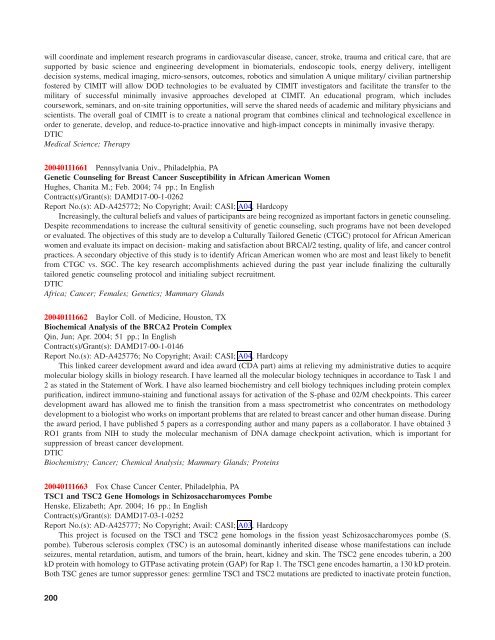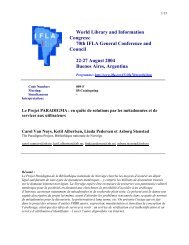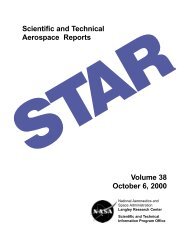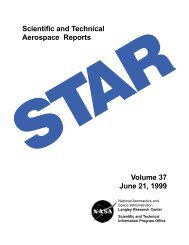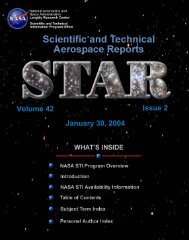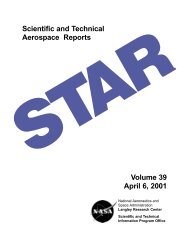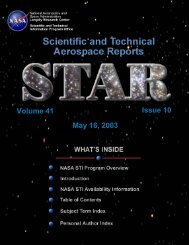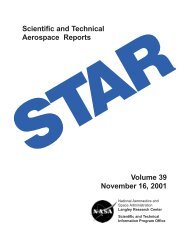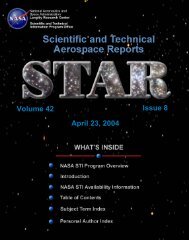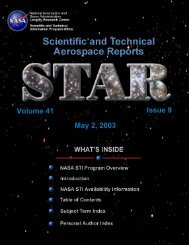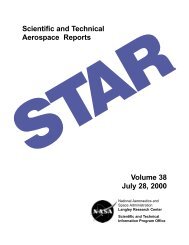- Page 2 and 3:
NASA STI Program ... in Profile Sin
- Page 4 and 5:
NASA STI Availability Information N
- Page 6 and 7:
Geosciences 42 Geosciences (General
- Page 8 and 9:
SCIENTIFIC AND TECHNICAL AEROSPACE
- Page 10 and 11:
20040111686 Naval Surface Warfare C
- Page 12 and 13:
air transport industry will also ad
- Page 14 and 15:
can be a useful tool for gathering
- Page 16 and 17:
Aviation related applications that
- Page 18 and 19:
An efficient methodology is present
- Page 20 and 21:
Fogleman. A document that took a ye
- Page 22 and 23:
flux focusing lens is incorporated
- Page 24 and 25:
In high speed engines, thorough tur
- Page 26 and 27:
09 RESEARCH AND SUPPORT FACILITIES
- Page 28 and 29:
(1/inch). The results generated for
- Page 30 and 31:
13 ASTRODYNAMICS Includes powered a
- Page 32 and 33:
20040120944 NASA Langley Research C
- Page 34 and 35:
Orbital debris in tow-Earth orbit r
- Page 36 and 37:
the current state of the art in sho
- Page 38 and 39:
discharge phenomena were investigat
- Page 40 and 41:
sufficiently different from GEO tha
- Page 42 and 43:
need and concept of the plasma expe
- Page 44 and 45:
20040111087 Science Applications In
- Page 46 and 47:
pump. Recall that the prior reporte
- Page 48 and 49:
of no penetration as described in S
- Page 50 and 51:
presented. Finally, the possible ap
- Page 52 and 53:
instrument were developed during th
- Page 54 and 55:
20040111432 NASA Glenn Research Cen
- Page 56 and 57:
decomposes. This approach is advant
- Page 58 and 59:
high surface areas (300-600 m(sup 2
- Page 60 and 61:
developed for tow level fiber. Comp
- Page 62 and 63:
This paper describes a new approach
- Page 64 and 65:
20040111390 NASA Glenn Research Cen
- Page 66 and 67:
is still important, the industry’
- Page 68 and 69:
engines. Epoxy reinforced with brai
- Page 70 and 71:
local, intermediate, and long range
- Page 72 and 73:
the effect of Cr on SCC. The alloy
- Page 74 and 75:
provide data from reference wetland
- Page 76 and 77:
nonparametric theory, he was able t
- Page 78 and 79:
cooling cycles produced during weld
- Page 80 and 81:
20040111168 California Univ., Lawre
- Page 82 and 83:
chemical compositional variation, h
- Page 84 and 85:
20040120859 Duquesne Univ., Pittsbu
- Page 86 and 87:
27 NONMETALLIC MATERIALS Includes p
- Page 88 and 89:
20040111196 Institute of Industrial
- Page 90 and 91:
The National Aeronautics and Space
- Page 92 and 93:
This report summarizes the findings
- Page 94 and 95:
esults show that the membranes expo
- Page 96 and 97:
development of a new performance-ba
- Page 98 and 99:
schedule for testing was developed,
- Page 100 and 101:
20040111137 Lawrence Livermore Nati
- Page 102 and 103:
20040111497 Military Equipment and
- Page 104 and 105:
20040120946 Cleveland State Univ.,
- Page 106 and 107:
electrons up to 2 MeV, floating pot
- Page 108 and 109:
Army, DARPA, MDA, Navy, NSA, and OS
- Page 110 and 111:
During the two-year duration of thi
- Page 112 and 113:
the design, operational and perform
- Page 114 and 115:
the surfaces can be brought togethe
- Page 116 and 117:
20040111228 NASA Langley Research C
- Page 118 and 119:
self-sustained due to the low Reyno
- Page 120 and 121:
slot in an orientation most nearly
- Page 122 and 123:
place in practice the formulated fl
- Page 124 and 125:
Direct numerical simulation was use
- Page 126 and 127:
Because the temperature rise on the
- Page 128 and 129:
activities and both funded and non-
- Page 130 and 131:
Time Stamping System, The Detection
- Page 132 and 133:
and remove self-interference signal
- Page 134 and 135:
An optical detector system includes
- Page 136 and 137:
proliferative response of corneal t
- Page 138 and 139:
The use of wind power is in a perio
- Page 140 and 141:
20040111963 NASA Langley Research C
- Page 142 and 143:
In this report the implementation o
- Page 144 and 145:
20040112043 NASA Glenn Research Cen
- Page 146 and 147:
weapons systems. For reasons arisin
- Page 148 and 149:
for the largest term in the series.
- Page 150 and 151:
20040111153 BP Solar, Frederick, MD
- Page 152 and 153:
20040112060 National Space Science
- Page 154 and 155:
predicted for Alloy 22, and validat
- Page 156 and 157: pollution influence exceeds Europea
- Page 158 and 159: 20040120889 Alternative Modes as an
- Page 160 and 161: considers the environment of the wh
- Page 162 and 163: GEOS-CHEM global three-dimensional
- Page 164 and 165: Our project focused on the investig
- Page 166 and 167: (FL-1016) (Salottolo 1994; Phillips
- Page 168 and 169: 20040111442 Harvard Univ., Cambridg
- Page 170 and 171: 20040120899 Geological Survey, Aust
- Page 172 and 173: 20040111443 National Space Science
- Page 174 and 175: 20040111528 Johns Hopkins Univ., Ba
- Page 176 and 177: 20040111546 Texas Univ., Houston, T
- Page 178 and 179: 20040111555 Baylor Coll. of Medicin
- Page 180 and 181: 20040111561 McMaster Univ., Hamilto
- Page 182 and 183: Some cellular factors that contribu
- Page 184 and 185: in commercially available seaweeds
- Page 186 and 187: 20040111584 State Univ. of New York
- Page 188 and 189: to a topic in or immediately applic
- Page 190 and 191: strengthens our central hypothesis
- Page 192 and 193: 20040111604 Winston-Salem State Uni
- Page 194 and 195: The objective of this proposal is t
- Page 196 and 197: 20040111622 Texas Univ., Houston, T
- Page 198 and 199: ole of CE-Q in initiation of prosta
- Page 200 and 201: 20040111633 Jackson (Henry M.) Foun
- Page 202 and 203: that are required for DNA replicati
- Page 204 and 205: 20040111649 Monash Univ., Clayton S
- Page 208 and 209: and loss of heterozygosity occurs i
- Page 210 and 211: esistance is frequent, perhaps exce
- Page 212 and 213: 20040111682 Burnham Inst., La Jolla
- Page 214 and 215: educators, researchers and professo
- Page 216 and 217: several similar genetic epidemiolog
- Page 218 and 219: Using a Resource-Based Theory/View
- Page 220 and 221: 20040111717 Beth Israel Deaconess M
- Page 222 and 223: Evidence show that TNFa is able to
- Page 224 and 225: observations that cells expressing
- Page 226 and 227: Early detection and intervention is
- Page 228 and 229: Metastasis-suppressor genes suppres
- Page 230 and 231: The objective was to produce breast
- Page 232 and 233: generally convex back surface, and
- Page 234 and 235: A method is presented for determini
- Page 236 and 237: 20040121111 Florida International U
- Page 238 and 239: of V and V and UQ at specified Conf
- Page 240 and 241: 60 COMPUTER OPERATIONS AND HARDWARE
- Page 242 and 243: holdings. A study released by the S
- Page 244 and 245: version compatibly issues surfacing
- Page 246 and 247: archive sets, application modules,
- Page 248 and 249: 20040111441 Prins Maurits Lab. TNO,
- Page 250 and 251: 20040111488 Industrieanlagen-Betrie
- Page 252 and 253: 20040111687 Naval Research Lab., Wa
- Page 254 and 255: Mass Storage Systems and Technologi
- Page 256 and 257:
the information exchange at the int
- Page 258 and 259:
20040121022 COPAN Systems, Inc., Lo
- Page 260 and 261:
Performance has always come at a st
- Page 262 and 263:
clusters with usually small IT budg
- Page 264 and 265:
20040121049 Singapore Univ., Singap
- Page 266 and 267:
This paper presents a dynamic techn
- Page 268 and 269:
Collaborative optimization is a des
- Page 270 and 271:
20040111304 NASA Langley Research C
- Page 272 and 273:
20040112056 NASA Langley Research C
- Page 274 and 275:
implemented within the OPTO-22 fram
- Page 276 and 277:
20040111478 Cornell Univ., Ithaca,
- Page 278 and 279:
An approach of dealing with cases w
- Page 280 and 281:
distribution of ions) with given in
- Page 282 and 283:
in the design and production of the
- Page 284 and 285:
20040111167 Lockheed Martin Corp.,
- Page 286 and 287:
program with emphasis on the advanc
- Page 288 and 289:
calculating power generation and us
- Page 290 and 291:
synchrotron phase (SPD), and fast p
- Page 292 and 293:
20040120918 Stanford Linear Acceler
- Page 294 and 295:
to probe the flaws in a laminate st
- Page 296 and 297:
adaptive and/or active methods of c
- Page 298 and 299:
72 ATOMIC AND MOLECULAR PHYSICS Inc
- Page 300 and 301:
therefore was intended to establish
- Page 302 and 303:
Ionospheric plasma interaction effe
- Page 304 and 305:
sites for arc inception are triple-
- Page 306 and 307:
20040120896 Georgia Inst. of Tech.,
- Page 308 and 309:
provide a more complete representat
- Page 310 and 311:
77 PHYSICS OF ELEMENTARY PARTICLES
- Page 312 and 313:
In the absence, for regulatory reas
- Page 314 and 315:
The Mission Mauagement Mice (MMO) i
- Page 316 and 317:
survive extreme climates, and to pr
- Page 318 and 319:
20040112007 NASA Langley Research C
- Page 320 and 321:
which uses the World Wide Web and o
- Page 322 and 323:
20040121011 NASA Langley Research C
- Page 324 and 325:
onset. In double Maxwellian plasmas
- Page 326 and 327:
20040121010 Space Telescope Science
- Page 328 and 329:
uncertainties and sets of uncertain
- Page 330 and 331:
space industry toward a broader bas
- Page 332 and 333:
20040111070 Instituto Superior Tecn
- Page 334 and 335:
20040111412 NASA Marshall Space Fli
- Page 336 and 337:
99 GENERAL Includes aeronautical, a
- Page 338 and 339:
The Kirchhoff Formula for a Superso
- Page 340 and 341:
The Kirchhoff Formula for a Superso
- Page 342 and 343:
ARTIFICIAL INTELLIGENCE A Concurren
- Page 344 and 345:
BLASIUS FLOW Effect of Far-Field Bo
- Page 346 and 347:
A-10 Microlocalization and Quantita
- Page 348 and 349:
CERAMIC FIBERS Ceramic Matrix Compo
- Page 350 and 351:
COMMAND AND CONTROL An Enemy within
- Page 352 and 353:
COMPUTERIZED SIMULATION AF-Geospace
- Page 354 and 355:
CRACK PROPAGATION A Comparison of W
- Page 356 and 357:
DEACTIVATION Inactivation of FGF Re
- Page 358 and 359:
Metamorphosis of a Hairpin Vortex i
- Page 360 and 361:
ELASTIC PROPERTIES Characterization
- Page 362 and 363:
EMISSION Effects of Large-Amplitude
- Page 364 and 365:
Mechanical Behaviour of Woven Graph
- Page 366 and 367:
FOREIGN BODIES Foreign Object Damag
- Page 368 and 369:
GRAIN SIZE High Pressure X-Ray Diff
- Page 370 and 371:
Autocine and Paracrine Control of B
- Page 372 and 373:
INDEPENDENT VARIABLES Linear Least
- Page 374 and 375:
Identification of Novel Genes Affec
- Page 376 and 377:
LOW TEMPERATURE ENVIRONMENTS Oxygen
- Page 378 and 379:
Regulatory Pathways Involved in Her
- Page 380 and 381:
MEDICAL PERSONNEL Correlation Betwe
- Page 382 and 383:
Robotics: Military Applications for
- Page 384 and 385:
NEURONS The Impact of Exercise on t
- Page 386 and 387:
ORDNANCE Standardized UXO Technolog
- Page 388 and 389:
PHASE SHIFT Detection of a PSK Sign
- Page 390 and 391:
POLYMERIC FILMS Clear, Conductive,
- Page 392 and 393:
Cost-Effective Remote Mirroring Usi
- Page 394 and 395:
REGENERATORS Overview 2003 of NASA
- Page 396 and 397:
SEALS (STOPPERS) Compliant Foil Sea
- Page 398 and 399:
SCDM in a Distributed Environment -
- Page 400 and 401:
Modeling of the Plasma Thruster Imp
- Page 402 and 403:
Implementation of Higher Order Lami
- Page 404 and 405:
Laser Velocimetry: The Elusive Thir
- Page 406 and 407:
THORIUM Evaluation of Thorium-232 D
- Page 408 and 409:
TURBULENCE MODELS A Variable Turbul
- Page 410 and 411:
WAFERS Wafer-Bonded Internal Back-S
- Page 412 and 413:
Abbenhuis, Oscar Simulation Interop
- Page 414 and 415:
Barrie, R. L. Stress Relaxation in
- Page 416 and 417:
Boykett, P. H. Fatigue Life Estimat
- Page 418 and 419:
Carter, Theresa Strategic Supply -
- Page 420 and 421:
Validation of NASCAP-2K Spacecraft-
- Page 422 and 423:
Dichtl, Rudy Challenges in Long-Ter
- Page 424 and 425:
Fattah, Nabil Abdel Developing Pass
- Page 426 and 427:
Galofaro, J. T. Solar Array Arcing
- Page 428 and 429:
Gundlach, R. B. Development of a Ca
- Page 430 and 431:
Holdsworth, David Long-Term Steward
- Page 432 and 433:
Janic, Milan An Application of the
- Page 434 and 435:
Kitchenka, Julie A. Feasibility and
- Page 436 and 437:
Lee, Rei GUPFS: The Global Unified
- Page 438 and 439:
Mahler, Ronald P. Unified Collectio
- Page 440 and 441:
Mikellides, I. G. Assessment of Hig
- Page 442 and 443:
Namkung, Min Classification of Magn
- Page 444 and 445:
Oun, Tae Hoon An Air Cargo Transshi
- Page 446 and 447:
Polomarov, O. V. Landau Damping and
- Page 448 and 449:
Ross, P. N. Atomistic Simulations o
- Page 450 and 451:
Shamma, Mohammed A. Application of
- Page 452 and 453:
Starr, Brett R. Aerocapture Perform
- Page 454 and 455:
Modeling of the Photoelectron Sheat
- Page 456 and 457:
Plasma Interactions With a Negative
- Page 458 and 459:
Williams, M. F. Sludge Batch 3 Simu
- Page 460:
Zhou, Feng A Design of Metadata Ser


